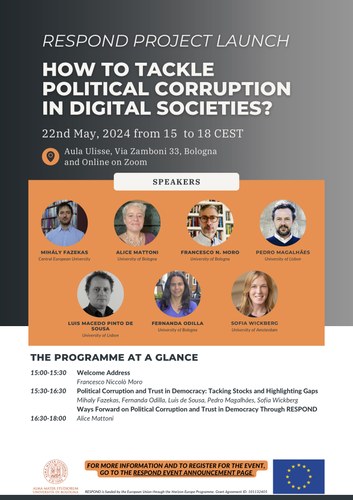The first RESPOND public event on how to tackle political corruption in digital societies
The new research project RESPOND warmly invited the Unibo academic community and stakeholders interested in corruption, democracy, and technology to its public launch online and in Bologna.
-
Date: 22 MAY 2024 from 15:00 to 18:00
-
Event location: Ulisse Room, Accademia delle Scienze - Via Zamboni 33, Bologna - In presence and online event
-
Type: Talk

The event will start with the "Welcome Address" of Alice Mattoni, Scientific Coordinator of the Project (University of Bologna), and Francesco Moro, Head of the Department of Political and Social Sciences - University of Bologna.
It will then feature the roundtable titled "Political Corruption and Trust in Democracy: Tacking Stocks and Highlighting Gaps", with academic partners from RESPOND: Mihály Fazekas(Central European University), Luis de Sousa and Pedro Magalhães (ICS-University of Lisbon), Sofia Wickberg(University of Amsterdam), and Fernanda Odilla (University of Bologna). Chaired by Alessandra Lo Piccolo (University of Bologna), the roundtable will discuss the major existing gaps in research on political corruption and how to address them.
Alice Mattoni will lead the closing session "Ways Forward on Political Corruption and Trust in Democracy Through the RESPOND project", in which she presents the five-year project led by Alma Mater Studiorum - Università di Bologna.
SPEAKERS
Mihály Fazekas is an associate professor at the Central European University, Department of Public Policy, with a focus on using Big Data methods to understand the quality of government globally. He is also the scientific director of an innovative think-tank, the Government Transparency Institute. He has a PhD from the University of Cambridge where he pioneered Big Data methods to measure and understand high-level corruption in Central- and Eastern Europe. His research and policy interests revolve around corruption, favouritism, private sector collusion, and government spending efficiency. He regularly consults international organisations such as the OECD and a range of national governments and NGOs across the globe. He led a team of FCDO UK, GTI, and IMF which won the 1st prize at the IMF Anti-Corruption Challenge for measuring corruption and its costs globally.
Pedro C. Magalhães is Senior Researcher at the Institute of Social Sciences of the University of Lisbon, Portugal. He does research on public opinion and political attitudes and behavior, with a particular focus on attitudes towards democracy.
Alice Mattoni is an Associate Professor in the Department of Political and Social Sciences at the University of Bologna. Her research focuses on the intersections between digital technologies and social movements, civil society organizations and movement organizations. As Principal Investigator of the ERC-funded project BIT-ACT (2019-2024), she has investigated how movement organizations develop and employ digital technologies and media to counter corruption across the world. This line of research is further developed in the RESPOND research project (2024-2029), of which Alice is the Scientific Coordinator.
Francesco Niccolò Moro is Head of the Department of Political and Social Sciences at the University of Bologna. He is a Professor of Political Science at the University of Bologna and an Adjunct Professor of International Relations at the Johns Hopkins University-SAIS Europe. His research focuses on collective violence, with particular reference to the strategies and organizational features of armed groups (and organized crime), the relationship between violence and governance, and national security policies. Francesco has been teaching and/or researching, among else, at the University of Warwick, the University of Florence, the University of Milan-Bicocca, LUISS Guido Carli in Rome, Istituto Italiano di Scienze Umane, Dickinson College in Bologna, MIT, Istituto di Scienze Militari Aeronautiche of the Italian Air Force, and the Fondazione Bruno Kessler.
Fernanda Odilla holds a Masters in Criminology and Criminal Justice and a PhD in Social Sciences and Public Policy from King's College London. She is currently a research fellow at the Department of Political and Social Sciences at the University of Bologna, as part of the ERC-funded research project BIT-ACT (Bottom-up Initiatives and Anti-corruption Technologies). Her research interests are control of corruption, accountability, and new technologies in the context of anti-corruption and integrity. She is the author of The Digitalisation of Anti-Corruption in Brazil: Scandals, Reforms and Innovation (Routledge, forthcoming).
Luís de Sousa is Principal Researcher at the Instituto de Ciências Sociais da Universidade de Lisboa (ICS-ULisboa). He is Chair of IPSA/RC20 on Political Finance and Political Corruption. He works and publishes primarily on corruption perceptions and control policies, political ethics regulation, regional integration, cross-border cooperation, local government, and comparative politics in general. He is Local Research Correspondent on Corruption for the European Commission and acts as an international consultant on corruption control and political ethics regulation for various international governmental and non-governmental organisations (e.g., SIGMA/OECD, Council of Europe, OSCE/ODIHR, UNDP, Transparency International, Global Integrity, etc.). He was also the founder and former Chair of TI-Portugal.
Sofia Wickberg is an assistant professor in the Department of Political Science of the University of Amsterdam. She previously taught at Sciences Po Paris, where she received her PhD, and at the University of Versailles Saint-Quentin-en-Yvelines (FR). She is associated with Sciences Po’s Centre for European Studies and Comparative Politics (CEE) and the Laboratory for Interdisciplinary Evaluation of Public Policies (LIEPP). She is a founding member of the Interdisciplinary Corruption Research Network (ICRN) and regularly collaborates with the OECD, the Open Government Partnership, the European Commission, the U4 Anti-Corruption Resource Centre and Transparency International. Her research looks at the politics of anti-corruption policy, the transnational anti-corruption community and increasingly at the implementation and reception of anti-corruption and integrity policies.
Highlights
-
-
Registration Form
To secure your attendance, please register here by 20th May 2024.
Note that there is a limited number of in-person places available.
Registration is also compulsory to participate online. In that case, a link to registered participants will be sent a few hours before the event.